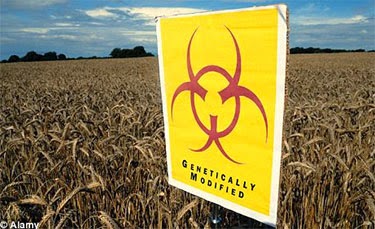 Melissa Melton
Melissa Melton
Activist Post
A truck filled with genetically modified canola overturned in the WA Great Southern region of Australia and a Senator and agricultural official of the green political party came forward to say the crash needs to be treated as a “serious biohazard”:
“Spills of this sort need to be treated as a serious biohazard, given the threat that widespread GM contamination could occur” Senator Rachel Siewert, Australian Greens agriculture spokeswoman, said.
“Non-GM farmers face huge financial losses if their crops are contaminated.”
“A release of this nature could also seriously threaten our natural environment. In situations when GM crops are spilt, there needs to be a priority placed on containment, clean-up and monitoring.”
The Australian Greens have also called for law changes including a moratorium on GM crops in WA to help protect Australian consumers and farmers alike from genetically modified contamination.
Here in the U.S., the U.S. Department of Agriculture is currently working on new strategies to aid in the ability of organic and GMO crops to “coexist” together, even though crops are grown in open fields and it isn’t like the wind is about to stop blowing any time soon.
A Food & Water Watch survey released earlier this month revealed that one third of America’s organic farmers have experienced GM contamination issues, and half of them have had what they thought were organic harvests rejected because of it:
“The USDA said they didn’t have this data, but all they had to do was ask,” Oren Holle, a farmer in the midwestern state of Kansas and president of the Organic Farmers’ Agency for Relationship Marketing (OFARM), which assisted in the new study’s production, told IPS.
“Our very strong feeling is that the introduction and propagation of the genetically modified products that are coming out under patent at this point have not had the regulatory oversight that they should have, and need to involve a far broader section of stakeholders. USDA has been extremely lax and, in our opinion, that’s due to the excessive influence of the biotech industry in political circles.”
 While Big Agra giants like Monsanto are notorious for suing farmers that are found growing the company’s patented GMO crops (sometimes apparently without the farmer’s knowledge), multiple cases of alleged purposeful contamination of non-GMO fields with genetically modified crops have also occurred.
While Big Agra giants like Monsanto are notorious for suing farmers that are found growing the company’s patented GMO crops (sometimes apparently without the farmer’s knowledge), multiple cases of alleged purposeful contamination of non-GMO fields with genetically modified crops have also occurred.
In 2006, two farmers from Missouri sued Bayer for contaminating their crops with experimental rice strains. The rice, which was not approved for human consumption, was growing in open field tests and ultimately contaminated more than 30% of U.S. rice cropland. Bayer was found guilty and ordered to pay $2 million in damages to the farmers, even though Greenpeace International estimates the total damages were somewhere between $741 million and $1.3 billion.
In the Reuters article, “Organic growers lose decision in suit versus Monsanto over seeds,” which details another win for Monsanto that came last June when an appeals court ruled that organic farmers could not block the biotech giant from suing them for accidental GMO contamination, commenter Historyrepeat wrote,
Might I point out that the first lawsuit Monsanto made was because one of their trucks ran off the road and the seeds were carried by the wind into the farmer’s field. Monsanto sued and won. I think their needs to be some investigation into how Monsanto’s trucks are transporting their seeds and where their trucks ‘supposedly’ break down or run off the road.
Melissa Melton is a writer, researcher, and analyst for The Daily Sheeple, where this first appeared, and a co-creator of Truthstream Media. Wake the flock up!


Be the first to comment on "GMO Canola Truck Crashes in Australia: Senator Says ‘Should Be Treated As a Serious Biohazard’"